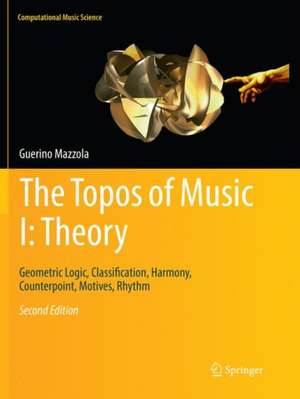The Topos of Music I: Theory: Geometric Logic, Classification, Harmony, Counterpoint, Motives, Rhythm: Computational Music Science
Autor Guerino Mazzolaen Limba Engleză Paperback – 11 dec 2018
| Toate formatele și edițiile | Preț | Express |
|---|---|---|
| Paperback (1) | 745.83 lei 38-44 zile | |
| Springer International Publishing – 11 dec 2018 | 745.83 lei 38-44 zile | |
| Hardback (1) | 819.69 lei 38-44 zile | |
| Springer International Publishing – 11 apr 2018 | 819.69 lei 38-44 zile |
Din seria Computational Music Science
- 24%
 Preț: 913.53 lei
Preț: 913.53 lei - 18%
 Preț: 726.85 lei
Preț: 726.85 lei - 20%
 Preț: 596.63 lei
Preț: 596.63 lei - 20%
 Preț: 589.20 lei
Preț: 589.20 lei -
 Preț: 388.13 lei
Preț: 388.13 lei - 15%
 Preț: 648.05 lei
Preț: 648.05 lei - 20%
 Preț: 326.32 lei
Preț: 326.32 lei - 20%
 Preț: 333.04 lei
Preț: 333.04 lei - 20%
 Preț: 335.52 lei
Preț: 335.52 lei - 20%
 Preț: 308.98 lei
Preț: 308.98 lei - 20%
 Preț: 597.29 lei
Preț: 597.29 lei - 20%
 Preț: 505.81 lei
Preț: 505.81 lei - 20%
 Preț: 504.98 lei
Preț: 504.98 lei - 20%
 Preț: 940.47 lei
Preț: 940.47 lei - 24%
 Preț: 612.93 lei
Preț: 612.93 lei - 20%
 Preț: 501.20 lei
Preț: 501.20 lei - 20%
 Preț: 533.76 lei
Preț: 533.76 lei - 18%
 Preț: 725.92 lei
Preț: 725.92 lei - 15%
 Preț: 579.99 lei
Preț: 579.99 lei -
 Preț: 487.96 lei
Preț: 487.96 lei - 18%
 Preț: 1116.26 lei
Preț: 1116.26 lei
Preț: 745.83 lei
Preț vechi: 981.35 lei
-24% Nou
Puncte Express: 1119
Preț estimativ în valută:
142.76€ • 155.12$ • 119.100£
142.76€ • 155.12$ • 119.100£
Carte tipărită la comandă
Livrare economică 16-22 aprilie
Preluare comenzi: 021 569.72.76
Specificații
ISBN-13: 9783030097172
ISBN-10: 303009717X
Pagini: 656
Ilustrații: XLIX, 656 p. 175 illus., 162 illus. in color.
Dimensiuni: 210 x 279 mm
Ediția:Softcover reprint of the original 2nd ed. 2017
Editura: Springer International Publishing
Colecția Springer
Seria Computational Music Science
Locul publicării:Cham, Switzerland
ISBN-10: 303009717X
Pagini: 656
Ilustrații: XLIX, 656 p. 175 illus., 162 illus. in color.
Dimensiuni: 210 x 279 mm
Ediția:Softcover reprint of the original 2nd ed. 2017
Editura: Springer International Publishing
Colecția Springer
Seria Computational Music Science
Locul publicării:Cham, Switzerland
Cuprins
Preface to the Second Edition.- Preface.- Part I Introduction and Orientation.- Part II Navigation on Concept Spaces.- Part III Local Theory.- Part IV Global Theory.- Part V Topologies for Rhythm and Motives.- Part VI Harmony.- Part VII Counterpoint. Part XXIV References and Index.
Textul de pe ultima copertă
This is the first volume of the second edition of the now classic book “The Topos of Music”. The author explains the theory's conceptual framework of denotators and forms, the classification of local and global musical objects, the mathematical models of harmony and counterpoint, and topologies for rhythm and motives.
Caracteristici
Describes a universal conceptual approach to the computational science of music Comprises detailed models of harmony, rhythm, motives, and counterpoint, together with classic examples from the compositions of Beethoven and Schumann Presents an indispensable basis for computer implementation of musical creativity and analysis of harmonic, motivic, contrapuntal, and rhythmical structures Offers a unique source to learn about classification theorems and lists of local and global musical structures
